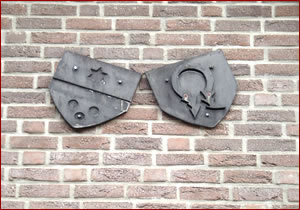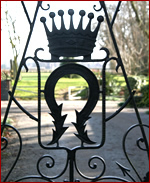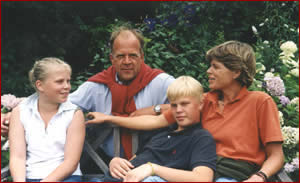|
After
the death of Emilie von Loë in 1949, her oldest
son Degenhardt Baron von Loë, who had been a prisoner
of war, took over the estate with numerous refugee families
from the East at Wolfskuhlen Castle.
After his marriage to Huberta Baroness von Lüninck
(daughter of Ferdinand Baron von Lüninck, who had
been executed in Berlin on 20 July 1944) and leasing
the Castle to the head office of "Steinkohlen-Zeche
Rheinpreussen" (later Ruhrkohle AG ), he and his
family were able in 1959 to move into the opposite farmstead,
the "Wolfskuhlenhof".
For several years, the castle itself served as a home
for mining apprentices and was subsequently used as
an educational establishment by the Jugendsozialwerk
e.V. (youth social work organisation) and other social
institutions, before it fell into disrepair while standing
empty in the 1980s.
Together with his wife, Degenhardt Baron von Loë
actively managed the once horticulturally oriented agricultural
estate within his means to become a flourishing dairy
cow, and later, pig-fattening enterprise.
 |
Following
the death of Degenhardt Baron von Loë in 1987,
his son Roderich Baron von Loë and his wife
Ebba Baroness von Loë, née von Klinggräff,
took on the further development of the family estate.
|
Due to
the fortunate circumstances of the reunification
in 1989 and titles to old property of the von Klinggräff
family from Mecklenburg-West Pomerania, today's
estate could be extended beyond its borders on the
Lower Rhine.
Eight centuries of family history on the Lower Rhine,
in the neighbouring Belgium and in Mecklenburg-West
Pomerania, however, make it impossible to give a
full account here.
|
 |

|
The family
history continues with the younger generation
ensuring the preservation of their ancestors'
estate through effective management and responsible
actions toward those entrusted to their care.
|
| <<
previous
page |
|
|